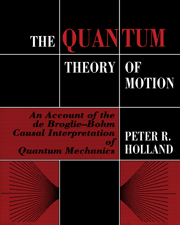 The Quantum Theory of Motion
The Quantum Theory of Motion Book contents
- Frontmatter
- Contents
- Preface
- 1 Quantum mechanics and its interpretation
- 2 Hamilton–Jacobi theory
- 3 Elements of the quantum theory of motion
- 4 Simple applications
- 5 Interference and tunnelling
- 6 The classical limit
- 7 Many-body systems
- 8 Theory of experiments
- 9 Spin ½: the Pauli theory
- 10 Spin ½: the rigid rotator
- 11 The Einstein–Podolsky–Rosen experiment and nonlocality
- 12 Relativistic quantum theory
- References
- Index
8 - Theory of experiments
Published online by Cambridge University Press: 20 January 2010
- Frontmatter
- Contents
- Preface
- 1 Quantum mechanics and its interpretation
- 2 Hamilton–Jacobi theory
- 3 Elements of the quantum theory of motion
- 4 Simple applications
- 5 Interference and tunnelling
- 6 The classical limit
- 7 Many-body systems
- 8 Theory of experiments
- 9 Spin ½: the Pauli theory
- 10 Spin ½: the rigid rotator
- 11 The Einstein–Podolsky–Rosen experiment and nonlocality
- 12 Relativistic quantum theory
- References
- Index
Summary
Measurement in classical physics
Measurements in classical physics are the means by which we come to know the current state of a mechanical system without appreciably disturbing it. The laws of classical mechanics imply that we may interact with the system in such a way that this ideal may be approached arbitrarily closely, at least in principle (i.e., in theory, ignoring practical problems). The aim of this chapter is to examine how far we must revise this programme in the quantum theory of measurement.
Did the classical physicist believe in the objective existence of material systems with well-defined position and momentum just because these quantities could be empirically determined with arbitrary precision at the same time? It seems she made a stronger assumption than this; that two successive observations of an apple, first in a tree and then on the ground, are connected to one another by virtue of the fact that the apple actually has a definite position and momentum at each instant, whether it is observed or not. Thus, the programme of classical physics was not merely to predict the results of future experiments by inserting data from previous ones into the laws of motion, but to show how the observations are a function of a causally connected sequence of unique processes undergone by the system of interest, which possesses properties independently of measurements. Measurement was then something of a secondary affair and indeed, prior to quantum mechanics, the theory of measurement as a distinct branch of theoretical physics did not exist.
Information
- Type
- Chapter
- Information
- The Quantum Theory of MotionAn Account of the de Broglie-Bohm Causal Interpretation of Quantum Mechanics, pp. 324 - 378Publisher: Cambridge University PressPrint publication year: 1993